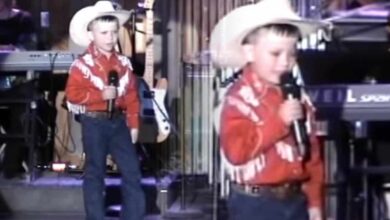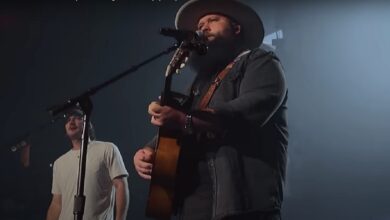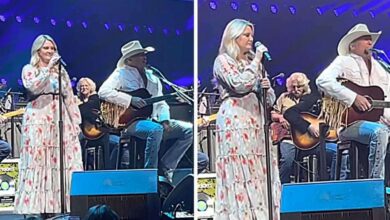Eddy Arnold And LeAnn Rimes Showcased An Impressive Yodeling Duel In Their “Cattle Call” Performance
“Cattle Call,” a quintessential classic in the country music genre, was first recorded by Eddy Arnold in 1944. This song stands out for its distinctive Western swing sound and its unique feature: the cowboy’s “cattle call” yodel. Arnold’s rendition of the song not only exemplified his smooth vocal style but also highlighted his exceptional yodeling technique, which became a hallmark of his musical identity. The combination of these elements not only showcased Arnold’s musical talents but also helped to create an emotional connection to the imagery of the cowboy lifestyle, which resonates deeply in American culture.
Arnold’s version of “Cattle Call” quickly gained popularity, reaching the top of the Billboard Juke Box Folk Records chart in 1945. The song’s success was a testament to Arnold’s ability to blend traditional country elements with innovative touches. The lyrics, which paint a vivid picture of a cowboy’s daily life and his interaction with his cattle, are delivered with Arnold’s signature charm and authenticity. The memorable refrain, featuring his yodeling, adds a layer of authenticity and appeal that helped cement the song’s place in country music history. This track not only highlighted Arnold’s vocal prowess but also his ability to tell a story, which is a critical element in country music songwriting.
The song’s Western swing influence reflects a style that was popular in the 1940s, combining elements of jazz and swing with traditional country sounds. Arnold’s smooth vocal delivery, paired with the rhythmic yodeling, created a sound that was both soothing and engaging, capturing the essence of the cowboy experience. His ability to convey the bond between the cowboy and his herd through music was a significant factor in the song’s enduring appeal. In many ways, “Cattle Call” serves as a sonic postcard from a time when the open range and cattle drives were integral parts of the American West.
Over the years, “Cattle Call” has been covered by numerous artists, each bringing their own interpretation to the classic tune. One of the most notable covers came from Elvis Presley, who included a version of the song on his 1969 album “From Elvis in Memphis.” Presley’s rendition introduced the song to a new generation of listeners, showcasing his versatility and respect for traditional country music. This version contributed to the song’s continued relevance and popularity, reinforcing the notion that country music has a universal appeal that transcends generations.
The influence of “Cattle Call” extends beyond its original recording and subsequent covers. It has become a staple in the country music repertoire, often performed in live shows and celebrated for its nostalgic value. Its catchy melody and heartfelt lyrics resonate with audiences, evoking images of the American West and the timeless appeal of cowboy life. The song serves not only as entertainment but also as a cultural touchstone for many fans of country music, who appreciate its roots and the stories it tells.
Eddy Arnold’s impact on country music was significant, and “Cattle Call” remains one of his most enduring contributions. Arnold, often referred to as the “Tennessee Plowboy,” enjoyed a prolific career marked by numerous hits and a pioneering role in shaping the country music genre. His blend of smooth vocals, yodeling, and storytelling helped define the sound of mid-20th-century country music. During his career, Arnold garnered numerous awards and accolades, solidifying his place as a key figure in the industry’s transformation and evolution.
Eddy Arnold was born on May 15, 1918, in Henderson, Tennessee. He rose to fame during a time when the country music scene was rapidly evolving, bridging the gap between traditional country sounds and the more polished, pop-influenced styles that emerged in the post-war years. Arnold’s vocal style and songwriting embodied a smoothness that attracted a broader audience, contributing to the popularization of country music across America. This blend of influence is evident in “Cattle Call,” as it melds the heart of traditional country with a contemporary flair.
Through his career, Arnold recorded over 500 songs and had more than 140 charted singles. His innovative approach not only kept him relevant during changing musical tides but also inspired countless artists who followed in his footsteps. The enduring appeal of “Cattle Call” can be seen as part of Arnold’s legacy, contributing to the ongoing fascination and appreciation for the cowboy archetype and the lifestyle it symbolizes.
The song’s legacy is a reflection of Arnold’s artistry and the broader cultural fascination with the cowboy archetype. As country music continues to evolve, “Cattle Call” stands as a testament to the genre’s rich history and its ability to capture the essence of American life through music. Its continued popularity is a reminder of the timeless appeal of classic country songs and their enduring place in the hearts of music lovers. The song encapsulates a spirit of freedom and connection to the land, themes that resonate deeply in the American consciousness.
As new generations discover and reinterpret “Cattle Call,” its place in the fabric of country music will undoubtedly continue to grow. Artists who cover this song often cite Arnold’s original as a source of inspiration, ensuring that the legacy of both the song and its creator lives on. The emotional resonance of the lyrics paired with the strong sense of nostalgia they provoke ensure that “Cattle Call” is much more than just a song; it is a bridge connecting listeners to the timeless stories of the American West and the enduring spirit of the cowboy. The yodeling motif, a vocal technique traditionally associated with expressing deep emotion and connection to the earth, still finds its place within modern renditions and continues to captivate fans both new and old.





